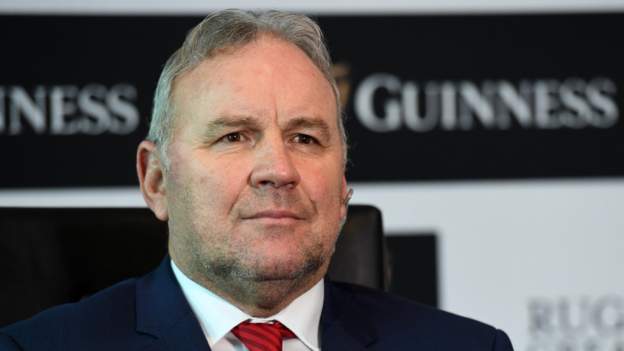
Nobody needs to tell Wayne Pivac what is at stake in this year's Six Nations.
2020 could not have been a more challenging year with Covid-19 dominating proceedings. There were only three wins in 10 games; a double success over Italy and a victory against Georgia.
There were defeats against England, France and Ireland - all twice - plus a rare loss against Scotland, with Wales finishing fifth in the Six Nations, their worst tournament result since 2007.
A blip on the road, then, to the 2023 World Cup. This is the destination everything is building towards in the Pivac project.
The challenge Pivac knows he faces is achieving enough short-term success to ensure he lasts until the global tournament in France in two-and-a-half years.
The New Zealander signed a four-year contract when he took over from Warren Gatland after the 2019 World Cup.
There is understood to be a release clause in 2021, although that has not been confirmed by Welsh Rugby Union interim chief executive Steve Phillips.
When asked whether Pivac is under pressure, Phillips replied: "I'm not going to answer that, but what I will say to you is Wayne and I are very closely aligned on our ambitions, aims and objectives.
"Everybody recognises this is now tournament rugby and we need to be performing. It all forms part of our rugby 2023 plan.
"While we were perhaps more in development in the autumn, this is now more about performing on the field, starting on Sunday.
"Needless to say Wayne doesn't need me or anyone else to tell him what the Six Nations is. It's an historical tournament and everybody has expectations.
"The mood music in the camp seems good and (it is) like nobody is underestimating what the expectation is here, whether that be Wayne, his coaching assistants or the players. The expectation and preparation is there and I can promise you they are working very hard."
Pivac acknowledges the microscope he finds himself under as he battles to impose his identity on a side that had been shaped by Gatland over a 12-year period.
His promised new style has not yet emerged and selection has been inconsistent, which has attracted criticism.
"It's still everything I was expecting," said Pivac.
"I'm representing a group of people and a country that is proud of their national team and are very passionate and love the game, as we all do.
"We know exactly where we're at. We don't need to be told. We know the pressure's building, if you like, in terms of expectations and results.
"Nobody puts more expectation on results than the group themselves, that's what people need to understand.
"This is what we do for a living. Anybody can coach when you're winning.
"The challenges are when you're in situations where you haven't done as well as you would have liked and hopefully this group is going to rise to that challenge."
So what has he learned from 2020?
"The autumn series results weren't around a lack of effort but we went in with a different philosophy for that," Pivac added.
"On reflection we didn't come out of lockdown well. We were behind the eight ball. We know that from the amount of testing we did.
"What we've done differently this time is we've focused more on getting our game in order rather than just getting the boys to a stage where they can compete over 80 minutes.
"Everybody's rolled their sleeves up and done a good job."
Pivac has insisted he is not surprised Wales have been written off in so many quarters, with Irish pundits like Stephen Ferris criticising the selection of Dan Lydiate and writing off the hosts' general chances this weekend.
Wales and Ireland verbal spats are nothing new and Pivac understands critics of his side.
"If you look at what we did post-lockdown it wasn't good and we weren't happy where we were at," said Pivac.
"We're in a different space now. Judge this team after Sunday with the comments that have been made."
For all the positive pronunciations, preparation this week has not been ideal.
Pivac was forced to announce first-choice wing Josh Adams was suspended for two games because he had broken Covid-19 lockdown rules by attending a family gathering in another person's home.
"It's not what any team wants at the start of a Test week, but we've discussed it, put it to bed and now the players are focused on the game," said Pivac.
"Things like that can galvanise you as a group, but it's the Six Nations start and the motivation is there."
Pivac is banking on older heads after picking the most experienced starting side in Welsh history against Ireland, with 874 caps.
"It's a lot of experience, isn't it?" said Pivac.
"Hopefully that experience can tell on the opposition. The team has come together very well, players have come back in that have been out for a while like Ken Owens, Josh Navidi and Dan Lydiate. They have all put their hand up in training and worked hard. That's rubbed off on everyone."















 Phone: (800) 737. 6040
Phone: (800) 737. 6040 Fax: (800) 825 5558
Fax: (800) 825 5558 Website:
Website:  Email:
Email: 






